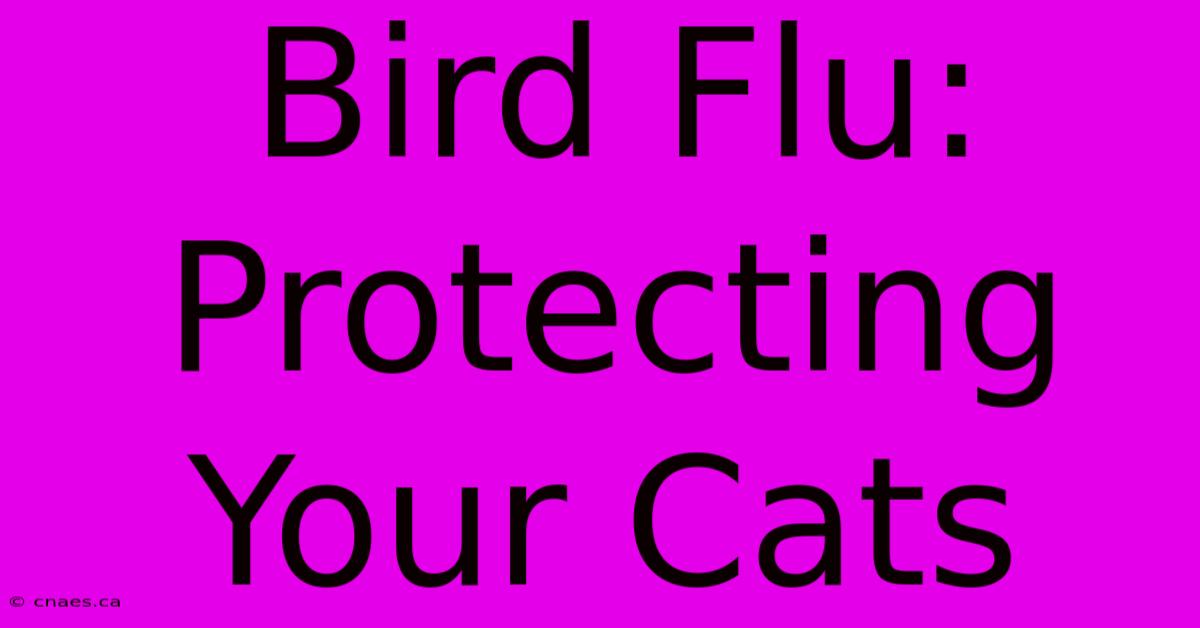Bird Flu: Protecting Your Cats

Discover more detailed and exciting information on our website. Click the link below to start your adventure: Visit My Website. Don't miss out!
Table of Contents
Bird Flu: Protecting Your Cats
Avian influenza, commonly known as bird flu, is a serious viral disease affecting birds. While primarily impacting poultry and wild birds, there's growing concern about the potential risk to other animals, including cats. Understanding the risks and taking preventative measures is crucial for protecting your feline companions.
Understanding the Threat of Bird Flu to Cats
While cats are not considered the primary host for avian influenza viruses, there have been documented cases of cats contracting the disease, primarily through direct contact with infected birds or their droppings. The virus can cause various symptoms, ranging from mild respiratory illness to severe complications. It's crucial to note that not all strains of bird flu pose the same level of risk to cats. Some strains are more easily transmissible and cause more severe illness.
How Cats Contract Avian Influenza
The most common way cats contract bird flu is through:
- Direct contact with infected birds: This could involve hunting, interacting with sick or dead birds, or even sharing close living spaces with infected poultry.
- Indirect contact: Consuming contaminated food or water or coming into contact with infected bird droppings.
Protecting Your Cats from Bird Flu
The best defense against bird flu is prevention. Here are several strategies to protect your cats:
1. Limit Contact with Birds
- Supervise outdoor cats: Keep a close eye on your cats when they are outside, particularly during bird migration seasons. Consider keeping them indoors, especially during outbreaks.
- Discourage hunting: Train your cats to avoid hunting birds. This might involve providing alternative forms of enrichment and play.
- Avoid contact with dead birds: Never allow your cat to interact with dead or sick birds. Report any sightings of dead birds to your local animal control or wildlife authorities.
2. Maintain Good Hygiene
- Regular handwashing: Wash your hands thoroughly after handling birds or anything that might have been in contact with birds.
- Clean up bird droppings: Remove bird droppings promptly from your property and dispose of them properly.
- Sanitize feeding and water bowls: Regularly clean and sanitize your cat's food and water bowls.
3. Monitor Your Cat's Health
- Be vigilant: Watch for any signs of illness, such as respiratory issues (coughing, sneezing), lethargy, loss of appetite, or diarrhea.
- Consult your veterinarian: If you notice any unusual symptoms, consult your veterinarian immediately. Early diagnosis and treatment are essential.
4. Stay Informed
- Follow official updates: Stay informed about bird flu outbreaks in your area by monitoring official government and animal health websites and advisories. Knowledge is your best weapon against the disease.
What to Do If You Suspect Your Cat Has Bird Flu
If you suspect your cat has contracted avian influenza, do not delay seeking veterinary attention. Your veterinarian will be able to conduct appropriate tests and provide the necessary treatment. Early intervention can significantly improve the chances of a positive outcome.
Remember: While the risk of cats contracting bird flu is lower than for birds, proactive prevention is crucial. By following these guidelines, you can significantly reduce the likelihood of your cat becoming infected. Your vigilance is the best protection for your feline friend.

Thank you for visiting our website wich cover about Bird Flu: Protecting Your Cats. We hope the information provided has been useful to you. Feel free to contact us if you have any questions or need further assistance. See you next time and dont miss to bookmark.
Also read the following articles
| Article Title | Date |
|---|---|
| Larranagas Miami Coaching Ends | Dec 27, 2024 |
| Hudson Meek Tragic Fall Death | Dec 27, 2024 |
| Liverpools Title Belief Grows | Dec 27, 2024 |
| Transfer Window Leeds Derby Battle | Dec 27, 2024 |
| Chinas Advanced Fighter Takes Flight | Dec 27, 2024 |
